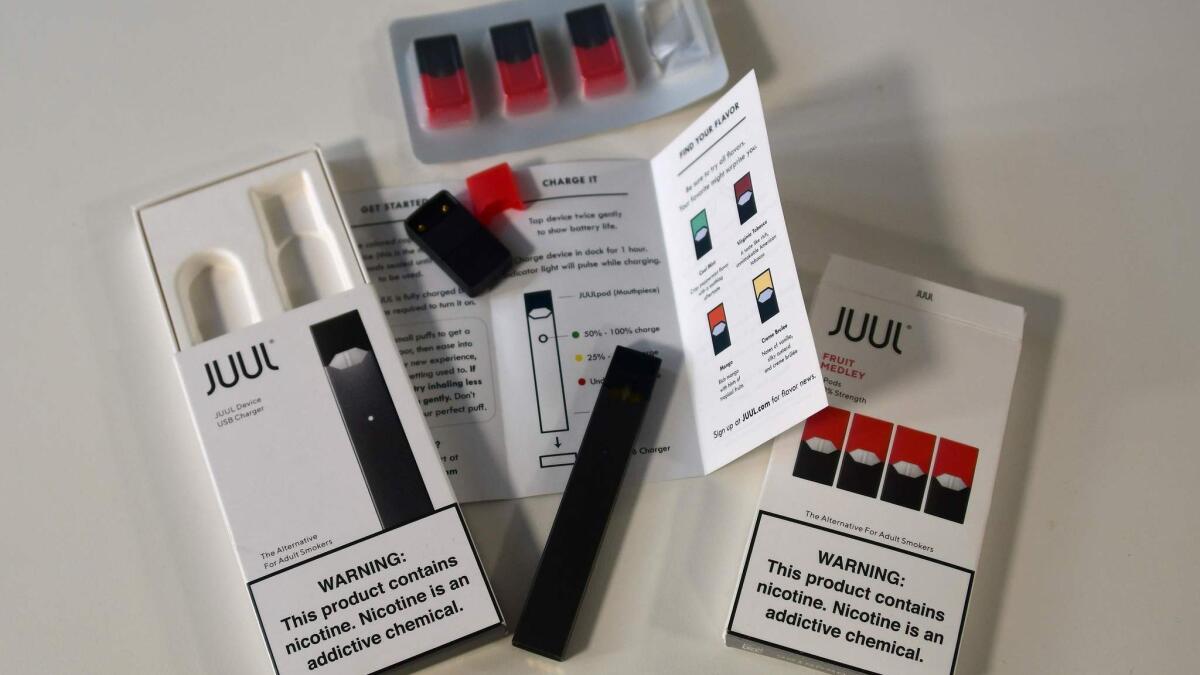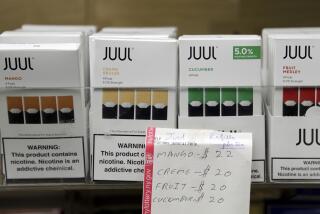Juul sells 35% stake to tobacco giant. Now the e-cigarette maker is worth more than Airbnb or SpaceX

Juul Labs Inc. sold a 35% stake to tobacco giant Altria Group Inc. in a $12.8-billion deal that turns the e-cigarette maker into one of Silicon Valley’s most valuable privately held companies and makes the tobacco giant relevant again for Americans who are averse to traditional smoking.
The deal, announced Thursday, values the San Francisco company at $38 billion and will put its vaping products next to Marlboro cigarettes on American retail shelves. Altria, which is focused on the U.S. market after spinning off Philip Morris International Inc. in 2008, will get one-third of the seats on Juul’s board upon antitrust clearance.
With smoking in decline, the deal furthers Altria’s push away from cigarettes and into higher-growth businesses. That includes its investment in Canadian cannabis company Cronos Group Inc., which gave it a 45% stake and an option to take majority control in the future.
For Juul, the tie-up more than doubles its valuation from just a few months ago, when it was worth $16 billion after Tiger Global Management led a $1.2-billion investment. The Altria deal makes Juul more valuable than Airbnb Inc. or Elon Musk’s SpaceX, though still less than Uber Technologies Inc.
Since launching in 2015, Juul has been a runaway success, attracting the ire of parents and regulators who say the company’s devices hook teenagers.
Juul’s dollar share of the U.S. e-cigarette market has soared to 53% from 16% a year ago, according to the market research firm IRI.
Its sleek battery-powered e-cigarette resembles a USB flash drive, can be used discreetly and comes in flavors such as mango, fruit and “creme.” That appeals especially to youngsters, critics contend.
Food and Drug Administration Commissioner Scott Gottlieb has called youth use of e-cigarettes an epidemic. Last month, Juul said it stopped selling its fruit-flavored nicotine pods to stores — after the FDA cited 40 retailers for violations related to youth sales of Juul products — and shut down its U.S.-based Facebook and Instagram accounts.
Gottlieb said last month that e-cigarette use had soared 78% this year among high school kids and 48% among middle school students. And a study released this week found that the number of U.S. high school students using tobacco surged by 1.3 million between 2017 and 2018. “This increase was driven solely by nicotine vaping,” the researchers wrote.
The FDA also sought documents from Juul related to how the firm markets its products, along with research that Juul has done on the use of its products by youths and the related health and behavioral effects of its e-cigarettes.
“We don’t yet fully understand why these products are so popular among youth,” Gottlieb said in a statement in April. “But it’s imperative that we figure it out, and fast.”
More than 1.3 million high school students started vaping nicotine in the last year, study says »
Juul, meanwhile, has positioned itself as a technology company on a mission to help addicted smokers quit tar-burning cigarettes.
As part of the agreement, Marlboro will put promotional material for Juul’s products in its cigarette cartons, according to a statement Thursday. Altria, which sells its cigarettes only in the United States, benefits from international exposure as Juul expands to new markets outside the country.
Altria also announced cost cuts of about $500 million to $600 million a year by the end of 2019. This includes culling “third-party spending across the business,” as well as workforce reductions, the company said.
Altria’s credit ratings were cut two levels to BBB — the lowest tier of the investment-grade ratings — by two firms: S&P Global Ratings and Fitch Ratings.
The Juul deal, combined with Altria’s investment in Cronos Group, will take the Richmond, Va., company’s leverage to nearly three times a measure of earnings, and both investments seem like “long-term plays that will not provide meaningful returns in the next couple of years,” S&P analysts said in a report.
In a conference call, Altria executives said the Juul deal will generate cash after one or two years and that the e-cigarette maker’s “significant” growth is expected to continue.
Altria’s stock fell 1.9% to $50.44 a share.
The deal is making Juul founders Adam Bowen and James Monsees the first e-cigarette billionaires.
Collectively, Juul employees are getting a $2-billion bonus as part of the deal, according to a person familiar with the matter who asked not to be identified because the details were private. The company has about 1,500 employees. It wasn’t immediately clear how the money would be divided among them.
Altria will be subject to a so-called standstill agreement under which it may not increase its stake beyond 35%. The cigarette maker also agreed not to sell the shares for six years, during which Juul will be Altria’s only e-vapor business.
Altria executives said that the deal had provisions that would prevent competitors from buying a large stake, but that nothing bars Juul from partnering with other companies internationally.
Executives said they had no knowledge of how the Food and Drug Administration viewed the deal.
Zaleski writes for Bloomberg.
More to Read
Inside the business of entertainment
The Wide Shot brings you news, analysis and insights on everything from streaming wars to production — and what it all means for the future.
You may occasionally receive promotional content from the Los Angeles Times.










